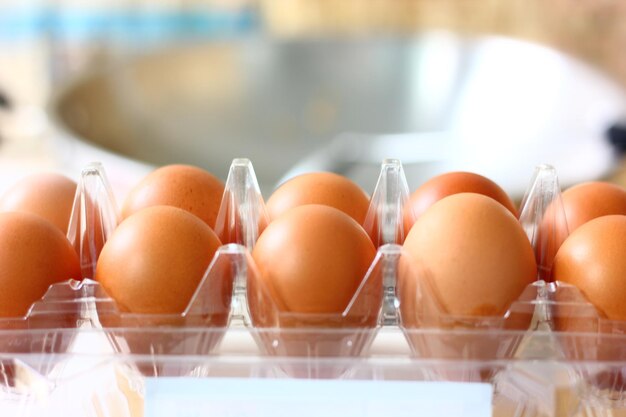How Long Do Eggs Last in the Fridge? Your Comprehensive Guide to Freshness 🍳
Cracking open an egg only to find it's gone bad can be a frustrating experience. To help you avoid this and make the most of your groceries, it's crucial to understand how long eggs can remain fresh in your refrigerator. Whether you're baking a cake, preparing a Sunday brunch, or just trying to organize your kitchen, this guide will provide you with everything you need to know about storing eggs efficiently.
🥚 The Shelf Life of Refrigerated Eggs
When kept in the refrigerator, eggs can remain fresh longer than at room temperature. The cold environment slows down the growth of bacteria, preserving their quality.
How Long Are Eggs Good in the Refrigerator?
In general, eggs can last 3 to 5 weeks in the refrigerator from the date of purchase. However, several factors can influence their freshness. Let's delve into these elements for a better understanding.
Factors Affecting Egg Freshness in the Fridge
- Packaging Date: Many egg cartons feature a "pack date," indicating when the eggs were packaged. Knowing this date can provide a more accurate shelf life estimation.
- Storage Conditions: Proper storage involves keeping eggs in their original carton and placing them in the coldest part of the refrigerator, not in the door where temperature fluctuations occur.
- Refrigerator Temperature: Eggs are best stored at temperatures between 33°F and 40°F (0.6°C to 4°C).
Best Practices for Storing Eggs in the Fridge
To maximize the shelf life of your eggs, adhere to these storage tips:
- Keep them in their carton: The carton protects the eggs and helps reduce moisture loss, also shielding them from pungent odors in the refrigerator.
- Position carefully: Store them in a cold area of the fridge, like the back of the main shelf, rather than the door.
- Check temperature settings: Regularly monitor your fridge's temperature to ensure optimal settings for egg preservation.
How to Tell If an Egg Has Gone Bad
Even with optimal storage conditions, it's crucial to know how to identify a bad egg. Here are some methods:
- The Float Test: Place the egg in a bowl of water. Fresh eggs typically sink, while older, potentially spoiled ones will float due to larger air cells developing inside.
- The Smell Test: A strong sulfur odor when cracking the egg is a clear sign that it has spoiled.
- Visual Check: Look for unusual discoloration or spots on the egg yolk or white.
🥗 Understanding Egg Expiration Labels
Egg cartons can have various labels, such as "sell-by," "use-by," and "best if used by." Here's how to interpret them:
- Sell-by date: The last date recommended for sale at the grocery store. Eggs can remain fresh for several weeks beyond this date if properly stored.
- Use-by/Best if used by: Indicates the duration the eggs will maintain optimal quality. These dates are more relevant for taste and texture rather than safety.
🍳 Related Subtopics: Enhancing Your Egg Knowledge
Beyond understanding the shelf life of eggs in the fridge, explore related areas to enrich your culinary experience:
Egg Preservation Techniques
For those with an excess of eggs, other preservation methods include freezing, pickling, or drying:
- Freezing Eggs: You can freeze eggs by cracking them into a bowl, beating to blend the yolk and white, and pouring the mixture into containers. For convenience, consider ice cube trays to portion the mix.
- Pickling: Hard-boiled eggs can be immersed in vinegar brine for a tangy, preserved treat.
- Drying: Dehydrating eggs is another way to extend their utility in your pantry.
Nutritional and Culinary Uses of Eggs
Understanding the diverse applications of eggs can empower you to make the most of this versatile ingredient:
- Health Benefits: Eggs are a rich protein source, containing essential vitamins and nutrients like B12, D, and choline.
- Culinary Versatility: They can be used in an array of recipes, from fluffy omelets and quiches to rich cakes and meringues.
Egg Storage for Different Types
It’s worthwhile to mention that different eggs, like duck or quail, might have different storage considerations:
- Duck Eggs: Generally have a thicker shell and can sometimes last longer in storage if kept at the right temperature.
- Quail Eggs: Despite their small size, they can have a shelf life similar to chicken eggs when refrigerated.
✨ Quick Storage Tips & Takeaways
Here's a quick checklist to keep your eggs fresh and avoid any spoiled surprises:
- 🥚 Check the carton's date labels for better freshness estimation.
- 🧊 Store eggs in their carton to protect from moisture loss and odors.
- 📍 Position eggs in the coldest part of the fridge.
- 🌡️ Maintain proper refrigerator temperature between 33°F and 40°F.
- 👃 Sniff when in doubt; a bad smell usually indicates a spoiled egg.
Visual Table: Egg Freshness in the Fridge
| Storage Method | Estimated Freshness Duration |
|---|---|
| Main refrigerator (carton) | 3 to 5 weeks from purchase |
| Hard-boiled (unpeeled) | Up to 1 week |
| Hard-boiled (peeled) | 1 to 2 days |
| Freezed egg whites | Up to 1 year |
| Freezed whole (beaten) | 9 to 12 months |
🔍 Final Insights on Egg Storage
Ensuring your eggs last as long as possible comes down to proper storage and understanding their expiration guidelines. With a few intentional strategies and knowledge about egg freshness, you can confidently enjoy your eggs without waste or risk.
By protecting your eggs from temperature fluctuations, odors, and moisture loss, you'll make the most of this nutrient-rich staple. Keep your fridge settings optimal, check dates, and always trust your senses—smell, sight, and touch can tell you a lot about your food's freshness.
Embrace the simple steps shared in this guide to make egg storage a seamless part of your kitchen routine, and you'll be rewarded with consistently fresh and delightful eggs. 🍳

